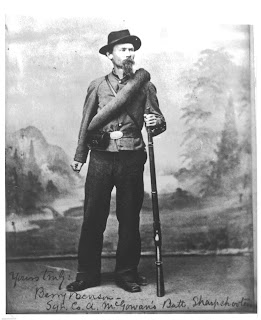By Rachel Dworkin, Archivist
At 3:30 am on the morning of October 7, 1864, a man emerged
from a hole on a side street by the northern fence of the Elmira Prison Camp. He
was Washington B. Traweek, a nineteen-year-old private from Alabama who had
been captured while serving with the Jeff Davis Artillery. There were Union
guards on patrol across the street, but they never noticed him as he snuck
along the fence before fleeing around a convenient corner. He was soon followed by nine other men, the
last emerging around 4:30 am. It was the single largest escape from the North’s
most secure prisoner-of-war camp.
The escape plot began on August 24th when John F.
Maull, John P. Putegnat, and Frank E. Saurine all swore a secret oath to dig
together. Traweek joined them almost immediately. The four men started digging
the tunnel from Maull and Putegnat’s tent located approximately 68 feet from
the camp’s northern stockade wall. The digging was exceptionally slow going so
they recruited six additional men, S. Cecrops Malone, Gilmer G. Jackson,
William H. Templin, J.P. Scruggs, Glen Shelton, and James W. Crawford, to help
out. Berry Benson of South Carolina
joined the team in early September after he spotted Traweek disposing of rocks
from the tunnel and asked to be let in.
 |
| Berry Benson in his old uniform after the war. |
The tunnel took months to dig. Two men would go down into the
tunnel where one man would dig with a pocket knife while another would load the
dirt into a bag made from a spare shirt. The team up top would unload the dirt
into their pockets to be disposed of later around camp and then send the bag
back down. Working in the tunnel was deeply unpleasant. In his memoir, Benson
said it was “next to death by suffocation to go into it.” The tunnel was so
narrow that the digger’s body blocked the flow of air leaving the digger sweltering
hot and struggling for oxygen. Diggers came up with racking headaches, dizziness,
and vomiting and needed to be relieved every 15 to 20 minutes.
 |
| The bag used to move dirt with insets of John P. Putegnat during and after the war. |
In mid-September, Traweek and Putegnat dug a second tunnel
from the newly constructed hospital, this time with a spade. They made it to
the wall in just two nights but, before they could gather their friends to get
them out, the tunnel was discovered. Traweek was thrown in the camp’s jail and the
guards conducted a camp-wide search for additional tunnels. Twenty-eight were
discovered, but not the team’s tunnel which was concealed by a carefully
preserved chunk of turf held in place by a plank just below the surface.
Traweek was released from the camp jail in late September to
rejoin his fellows. By this time, Saurine had been kicked off the team for
refusing to dig. It turned out to be a bad decision on his part. All of the
tunnel conspirators made it out and away. Maull, Jackson, and Templin made
their way south together on foot, as did Traweek and Crawford. Somehow Malone and
Putegnat got turned around and ended up in Ithaca. They headed still further
north before taking jobs in Auburn and using their earnings to travel to
Baltimore by train and boat. Benson and Scuggs both made their own ways home alone
while Shelton seemingly dropped off the face of the earth.
The escape was discovered during roll call on the morning of
October 7th and threw the camp into an uproar. Guards frantically
searched the camp and surrounding area for the tunnel and missing men. Wild
rumors circulated among the prisoners. One prison diarist, Wilbur Grambling, wrote
that 25 men had escaped, each with a stolen horse.
 |
| Morning roll call at the Elmira Prison Camp |
Although many others tried to replicate their feat, theirs was
the last successful tunnel escape at the camp. Seven other men managed to make their
way to freedom by various other methods. One smuggled himself out in a swill barrel.
Another stole a Union sergeant’s overcoat and strolled out the front gate
without being challenged. The most brazen escape was by a man named Buttons who
faked his own death and jumped out of a coffin on the way to the cemetery.
No comments:
Post a Comment